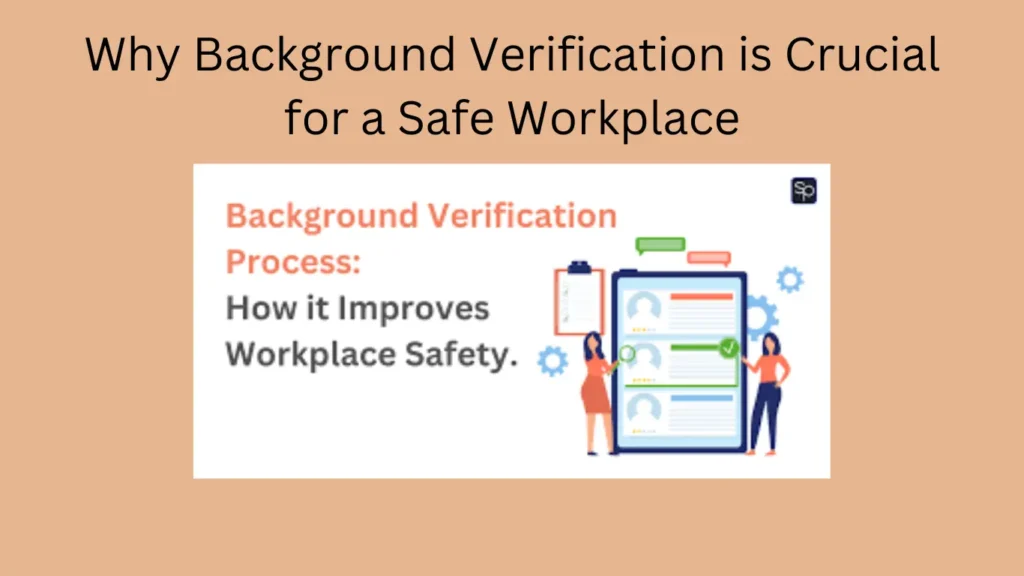In today’s competitive and dynamic business environment, ensuring a safe workplace is more important than ever. Background verification plays a crucial role in this process, helping employers build a secure, trustworthy, and efficient workforce. This guide explores the significance of background verification, detailing its benefits and providing practical insights to help businesses implement effective screening processes.
The Importance of Background Verification
- Enhancing Workplace Safety
- Background checks help identify potential red flags, such as criminal records or history of violence, reducing the risk of workplace incidents.
- Verifying employees’ credentials ensures that only qualified and trustworthy individuals are hired, creating a safer environment for all employees.
- Protecting Company Reputation
- Hiring individuals with a clean background helps maintain the company’s reputation, fostering trust among clients, partners, and the public.
- Avoiding scandals or legal issues related to negligent hiring practices safeguards the company’s brand and market position.
- Ensuring Regulatory Compliance
- Many industries have strict regulations regarding employee background checks. Compliance with these regulations is crucial to avoid legal penalties and maintain operational legitimacy.
- Regular background checks demonstrate the company’s commitment to adhering to legal and ethical standards.
- Preventing Fraud and Theft
- Screening potential hires for past financial misconduct or fraudulent activities helps prevent internal theft and financial losses.
- Verifying identity and employment history reduces the risk of hiring individuals with intentions to commit fraud.
- Enhancing Employee Morale and Trust
- A rigorous background verification process assures current employees that their colleagues have been thoroughly vetted, fostering a sense of security and trust within the team.
- Employees are more likely to be productive and engaged when they feel safe and valued in their workplace.
Key Components of Background Verification
- Criminal Record Check
- A thorough review of an individual’s criminal history, ensuring they do not have a record that could pose a threat to workplace safety.
- Employment History Verification
- Confirming the accuracy of a candidate’s employment history, including job titles, responsibilities, and reasons for leaving previous positions.
- Education and Credential Verification
- Validating the authenticity of academic qualifications and professional certifications, ensuring candidates have the necessary skills and knowledge.
- Identity Verification
- Ensuring the candidate’s identity is legitimate to prevent identity fraud and hiring under false pretenses.
- Reference Checks
- Contacting previous employers or professional references to gain insights into the candidate’s work ethic, reliability, and suitability for the role.
Best Practices for Effective Background Verification
- Develop a Clear Policy
- Establish a comprehensive background verification policy that outlines the types of checks to be conducted, the process, and the roles and responsibilities of involved parties.
- Use Reputable Screening Providers
- Partner with trusted background verification service providers to ensure accurate and reliable results.
- Maintain Confidentiality
- Handle all background check information with utmost confidentiality, respecting candidates’ privacy and complying with data protection regulations.
- Stay Updated with Laws and Regulations
- Regularly review and update your background verification processes to align with evolving legal requirements and industry best practices.
- Communicate with Candidates
- Clearly inform candidates about the background verification process during recruitment, ensuring transparency and addressing any concerns they may have.
Conclusion
Implementing robust background verification processes is essential for creating a safe, productive, and trustworthy workplace. By prioritizing thorough screening, companies can protect their reputation, ensure regulatory compliance, and foster a secure environment for all employees. Embrace these practices to build a strong foundation for your workforce and drive long-term success.
For further Inquires Contact Us
FAQs
What is background verification?
- Background verification is the process of checking a candidate’s criminal, employment, educational, and personal history to ensure they are fit for the job and trustworthy.
Why is background verification important for workplace safety?
- It helps identify potential risks by screening for criminal records and verifying qualifications, reducing the chance of hiring individuals who may pose a threat.
What does a typical background check include?
- A typical background check includes criminal record checks, employment history verification, education and credential verification, identity verification, and reference checks.
How can background verification protect a company’s reputation?
- By ensuring only qualified and trustworthy individuals are hired, background checks help avoid scandals, legal issues, and maintain the company’s good standing.
What are the best practices for conducting background checks?
- Develop a clear policy, use reputable screening providers, maintain confidentiality, stay updated with laws, and communicate transparently with candidates.
